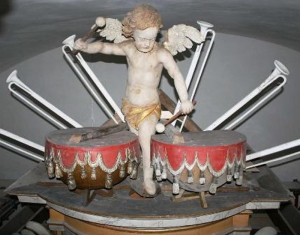Tags
basso continuo, bassoon, cantata, cello, chorus, Christoph Treutmann, Erschallet ihr Lieder, John Eliot Gardiner, Köthen, Kloster Grauhof, Komm Heiliger Geist Herre Gott, Leipzig, Martin Luther, oboe d'amore, Palace Church, Pentecost, Philipp Nicolai, recorder, timpani, trumpet, viola, violin, Weimar, Wie schön leuchtet der Morgenstern, Wilhelmsburg Palace

Detail of the Treutmann organ at Kloster Grauhof
Erschallet, ihr Lieder (BWV 172) was first performed three hundred years ago on 20 May 1714 on Pentecost. As with many of Bach’s cantatas, the libretto was compiled from a variety of sources: Bible text, contemporary poetry, in this case probably by Salomon Franck, and the chorales Komm, Heiliger Geist, Herre Gott by Martin Luther and Wie schön leuchtet der Morgenstern by Philipp Nicolai.
The four vocal soloists, a four-part chorus, and an orchestra of three trumpets, timpani, recorder, oboe d’amore, two violins, two violas, bassoon, cello, and basso continuo were situated in the music gallery high above the pews of the Palace Church at Weimar’s Wilhelmsburg. While the parts for the first performance are lost, a score and some performing materials for later performances in Köthen and Leipzig of the six movements of the cantata have survived.
John Eliot Gardiner has remarked that Bach “particularly valued” Erschallet, ihr Lieder and that it set “a pattern for his later approaches to the Pentecostal theme.” In line with the success of the opening and closing choruses, Bach reused their scoring of three trumpets and timpani in a triple meter to mark many other festive occasions.
